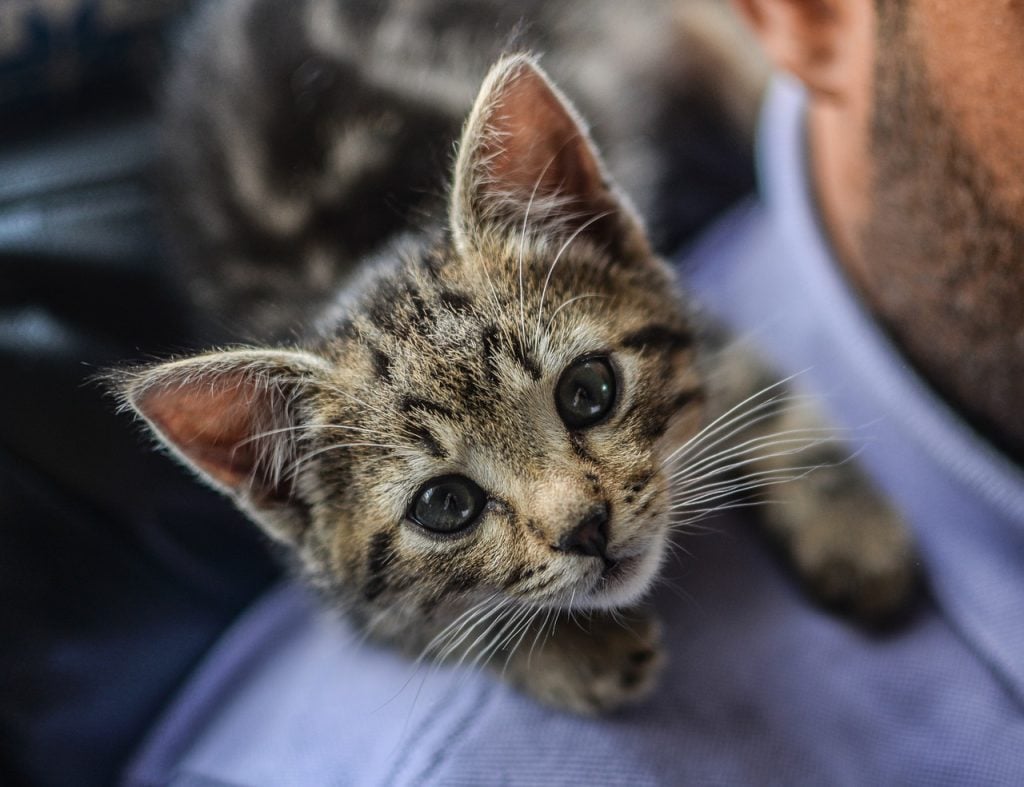- Not a substitute for professional veterinary help.
Every day around 11 am after I’ve been working at my desk for a couple of hours, my cat Iggy Noodle starts pawing at my legs. I try to ignore him, but he’s very persistent. He wants to be picked up. And as soon as I give in and lift him from the ground, he climbs up onto my shoulders, where he stays until I get tired of holding his 18 pounds.
Some cats refuse to be picked up or held, but Iggy can’t get enough of sitting on my shoulder. And a lot of my friends have shoulder cats, too. I started wondering if there’s a specific reason cats like to sit on shoulders, or if it’s just a quirk of particular kitties.
Why do cats sit on your shoulders? My guess is that they like to be up high, and they like to be close to people they trust, so shoulder-sitting gives them the best of both worlds. I’m no cat scientist—although that would be a pretty cool job title to have!—so I turned to research. Here’s what experts have to say about cats and shoulders.
1. Cats feel safer up high
View this post on Instagram
It may be counter-intuitive to human beings with height phobias, but our feline friends love to be up high. According to veterinarian Dr. Wailani Sung, writing for VetStreet, cats “are both predator and prey.”
Dr. Sung explains that, before cats were domesticated, they evolved to climb trees and otherwise get up high in order to stay safe from predators. In addition, being up above the ground made it easier for cats to spot prey.
Of course, your shoulder isn’t as high up or as steady as a tree. And if your cat is hunting prey in your living room, it may be time to call pest control. But cats’ natural affinity for high places might explain why some cats like to ride around on people’s shoulders.
2. Even cats need personal space
View this post on Instagram
If you’ve ever lived with more than one cat at a time, you know they can be territorial. According to Rover’s resident cat expert Mikel Delgado, being up high “helps them share the territory.” In other words, cats who aren’t getting the personal space they need on the ground may head for higher ground. That’s why cat perches and cat trees are so popular.
Depending on how tall you are, your shoulder may be the highest surface around. It could make an attractive perch for a cat who needs some personal space.
3. They long to be close to you
Although the height of your shoulder offers safety, that might not be the only reason your cat climbs up there. In an interview with Mother News Network, cat behavior consultant Ingrid Johnson explains that shoulder-riding may be an attention-seeking behavior.
For example, if you praise and pet your kitty for sitting on your shoulder, she’ll form a positive association with it, and will continue to do it in order to make you happy. Aw, isn’t that nice?
But don’t take it personally if your cat doesn’t sit on your shoulders, especially if they’re older or less athletic. Johnson notes that cats who can maintain a position on your shoulder are typically young and agile. It’s harder for older cats to keep their balance on a moving perch.
My own cat Iggy is a senior at 15 years old, and he’s never been athletic in his life. But he’s broad and heavy, which I think probably helps his center of gravity. On the other hand, maybe he’s just a weirdo—but what cat isn’t?
4. Sometimes, cats just do strange things
View this post on Instagram
Cat people know the truth: our pets can be weird. That’s why we love them. Sitting on your shoulder is one of those classic cat quirks, like knocking things off ledges or squeezing into too-small boxes.
There may not be a single, scientific explanation for why cats sit on your shoulders. But based on their preference for heights and their desire to please their people, shoulder-sitting makes a kind of sense.
Can you train a cat to sit on your shoulder?
Shoulder-sitting is instinctual for some cats. But it can also be taught! Yes, contrary to popular perception, it is possible to train a cat.
In the above video, a cat dad demonstrates how to gently introduce your cat to the idea of shoulder-sitting. He suggests starting slow. You want to encourage the cat, and “never try to force it out of its comfort zone.” Lots of pets and some delicious treats will help.
If your cat doesn’t sit on your shoulders, don’t worry. They may learn in time. And if your cat is as heavy as mine, you may not want them up there, anyhow.



